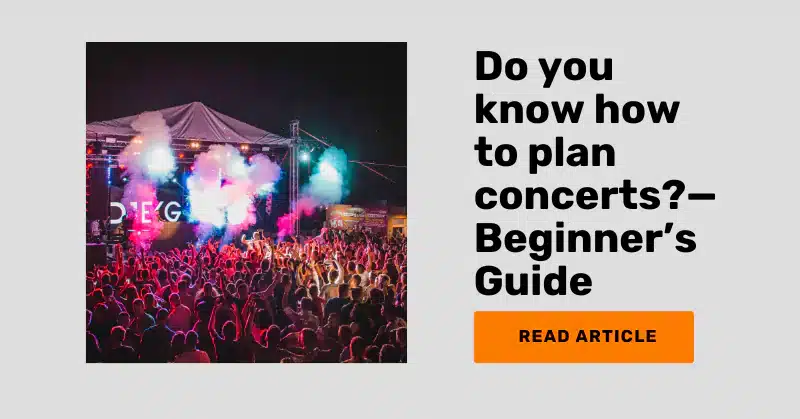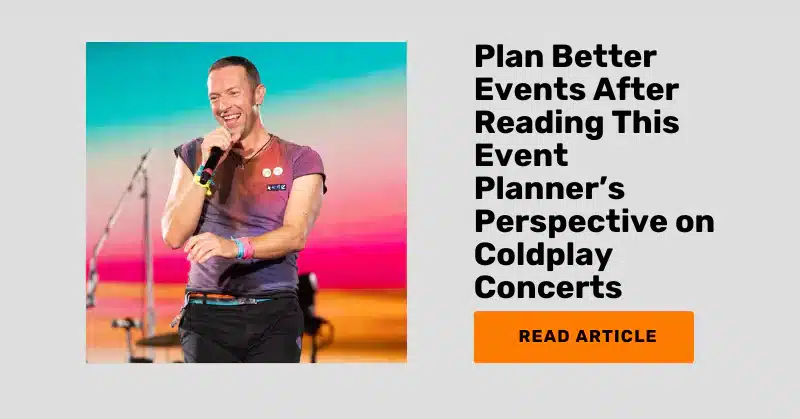If you’re learning how to plan a concert, then let us break it to you.
It won’t be like a cakewalk.
A concert is a live musical performance that brings together artists and audiences.
Planning a concert is more complex and time-consuming than planning other events.
This article covers everything you need to know if you want to plan a concert.
Let’s get into it!
A. Who organizes a concert?
Concert promoters are responsible for organizing live music events.
They perform the following tasks:
- Booking artists: They offer to make deals with the artists, usually through the artist’s agent or music manager
- Finding venues: They find venues to host the event
- Hiring staff: They hire people to work at the event and plan a concert alongside them
- Marketing: They promote and publicize the event
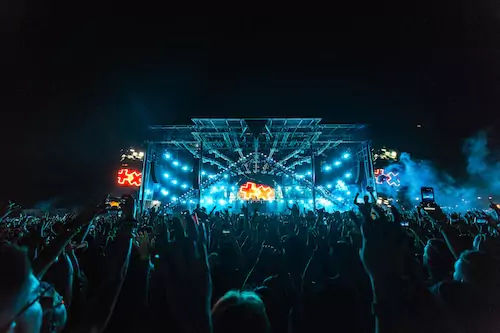
B. What is a concert checklist?
The concert days are very hectic and having a checklist can make a lot of difference.
And while it won’t reduce your workload, it will definitely give you a structure to plan a concert.
1. Venue Coordination
This involves arriving early at the venue to check the setup.
Additionally, it will help you ensure that everything is prepared according to plan.
2. Vendor Management
This involves coordinating with vendors like caterers, security, ticketing agencies, equipment rental companies, etc.
Here, you need to ensure they are working as per requirement.
3. Staff Coordination
This involves communicating with the event staff, volunteers, ushers, and security personnel.
You must assign duties and address any last-minute concerns that may arise.
4. Artists and Performers
When you plan a concert, you also plan how you have to host the artist.
Many of them have special demands such as particular hotels and food requirements.
This step involves addressing any issue they might have and ensuring their needs are met.
5. Time Management
This involves ensuring that all activities and performances take place according to the schedule planned.
Perfect coordination (and following checklists like this one) should take place to ensure that this happens.
6. Security
This is the most crucial point you should have on your concert checklist.
It involves taking care of the crowd flow to ensure that all the attendees are safe.
Plan ahead so that no safety concerns arise.
This also means to ensure a safe environment for the performers and staff.
7. Post-Event follow up
This involves having a follow-up session regarding the event after the event ends.
You should discuss important points such as areas for improvement and success points.
This gives you a guideline to plan a concert that is even better next time.
C. How to plan a concert?
Planning a concert is not simple.
It comes with a lot of logistics.
We’ve tried to simplify the steps to plan a concert.
This should help you get some direction.
1. Set up Goals
The first step when plan a concert is to establish clear goals and details.
You should be able to answer questions such as:
- What do you want to achieve with this event?
- Are you aiming to promote a new album or artist
- Are you looking to raise funds for a particular cause?
Having clearly defined goals gives your actions a direction.
2. Choose a Venue
While selecting a venue for your concert keep in mind the type of concert. More importantly, know your target audience or the audience you want to attract.
Your concert venue must have dressing rooms, a backstage area, a parking space, and restrooms.
These small details add a lot to the attendee experience.
You also need to choose between an outdoor or an indoor venue.
Outdoor venues provide more space but have restrictions like weather conditions and noise problems.
Indoor venues have a plus point on the same but provide limited spacing.
3. Accessibility
Your concert should be accessible to all.
This should include wheelchair access to the venue.
Sign language interpreters and audio descriptions are necessary for inclusivity.
Attendees who have hearing disability or are visually impaired individuals will benefit a lot from it.
And of course, the venue should have designated parking spaces for the specially-abled.
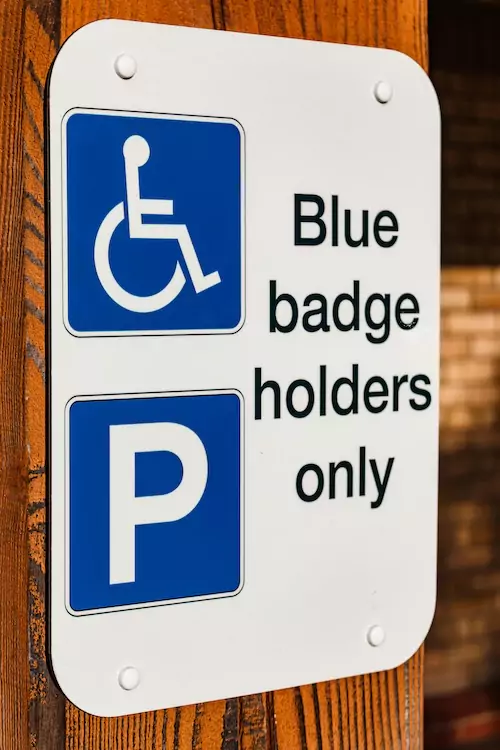
4. Concert Date
As an event planner, choosing the perfect date and time for your concert event is very crucial.
For example, let’s consider an your audience is primarily adults with full-time jobs. For them, evenings or weekends may be a preferable time and day to ensure maximum attendance.
Additionally, you should avoid choosing dates that clash with any other event. Such a clash may lead to the distribution of attendees.
5. Create a Budget
Consider all potential expenses while creating a budget such as:
- Artist fees
- Food and other stalls
- Sound and Light cost
- Marketing
- Rent
- Staff
- Licenses
Prioritize each of these expenses based on their importance.
Additionally, maintain a contingency fund for any unknown expenses that might arise in the future.
Pro Tip: To cut down costs, you can coordinate with potential sponsors and partners.
6. Permits and Licenses
Planning a concert requires a lot of permits and licenses for the legality and safety of your event.
Here are some of the permits and licenses you need to obtain in planning a concert:
- Noise Permit
- Event Permit
- Liquor License
- Music and Entertainment License
- Street Closure Permit
- Health and Safety Regulations
- Tent and Canopy Permit
- Pyrotechnic Display Permits
- Venue Permit
The process of obtaining these permits and licenses should be started in advance.
Failure to obtain these permits and licenses can result in fines, legal issues, or event cancellation.
7. Find the Perfect Talent
Your preparations will go in vain if you don’t get the right talent for your concert.
You must work hard and research to find a suitable talent for your event.
For example, if you want to organize a concert for Gen Z attendees, you can invite emerging artists that resonate with their tastes and interests.
While choosing an artist you also need to consider your budget. The artist fee depends on their popularity and experience.
Ensure that all agreements with the artist are in writing to avoid any disputes later on.
8. Logistics
Check your sound equipment, lighting, stage design, etc well in advance. You also need to test everything before the event.
9. Market Your Event
Concert marketing is very important as concerts rely on ticket sales for profit.
You need to come up with a marketing strategy that works for your brand.
Your marketing tactic should promote your event both online and offline.
10. Set Ticket Price
Next, you need to set up an open registration and ticket price on your event website.
Start by offering early bird and group discounts. This is a way to market your events as discounted prices attract a lot of audience.
To make the registration process easy you can set up a registration page and form.
Pro Tip: You have to keep adjusting the ticket prices as per requirements.
For example, if only the last few tickets are left and you don’t see any potential buyers for the same, you can put those tickets on sale.
11. Arrange Security and Staffing
Managing and controlling the crowd in large-scale events is important and difficult at the same time.
This is especially hard when you plan a concert. That’s why you need to hire an experienced security personnel.
Along with this, you need to hire staff like the ticketing staff, and event coordinators.
Pro Tip: You can use Ticket Generator which comes with a ticket authorization scanner to cut down on ticketing staff.
Just ensure that you create a safe and enjoyable experience for everyone attending the event.
D. How long does a concert last for?
A concert’s length can vary depending on the type of event and the artists performing in it.
- Short sets can last for 20-30 minutes
- Concerts by a well-known group can last a couple of hours
- If multiple artists are performing, a concert can last an entire evening
However, there are no rules.
Billie Eilish’s tour concerts are expected to last no more than 120 minutes
On dates where Taylor performs the full Eras Tour, the concert is 3 hours and 15 minutes long However, in some cases, the concerts have lasted as long as 3 hours and 45 minutes.
E. How do you set up a concert stage?
When you plan a concert, it’s never just about the artist a lot.
While the artist drives attendance with their popularity, it’s also a lot about the experience.
The stage setup is a huge part of the experience.
There are many things to consider while setting up a concert stage.
From the placement of the instruments and microphones to the lighting and sound systems.
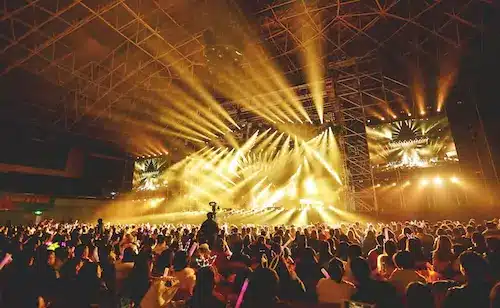
1. Lighting
Ensuring great lighting is one of the most important steps in setting up a stage.
This includes both the stage lights and any special effects like spotlights that you may want to use.
Make sure all the lights are working and are positioned to create the perfect atmosphere for the concert.
2. Sound System
The next step is to set up the sound system.
This includes both the speakers and any amplifiers that you may need.
Make sure that all of the equipment is in working condition. They must also be positioned in a way that will allow everyone in the audience to hear the music.
It’s also important to test them before the concert begins.
3. Instruments
Make sure that all of the instruments are in their correct positions as per the artists’ directions.
Test each instrument and run a sound check.
The last thing you want is for a musician to be unable to play their instrument.
4. Backstage Area
This is where the musicians and other performers get ready for their performances.
Make sure that there is enough space for everyone to move around.
F. What is a concert opening act?
The opening act is performed before the headliner at a concert. Its motive is to:
- Warm up the audience
- Set the tone for the event
- Get the crowd excited for the headliner
These acts usually last for 30-45 minutes.
G. How can you plan a concert tour?
A concert tour is when an artist or group of artists play a series of live shows across multiple cities or countries.
1. Plan the dates
Planning dates not only figures out if your tour clashes with any of your concerts.
It also makes sure that your dates don’t and locations are separate from any other artists’ events.
This ensures that you have the maximum attendance for your event.
2. Logistics
Figuring out the logistics when you plan a concert or tour should be one of the top priorities.
You would not want to risk any fault in equipment.
Nicki Minaj experienced several problems during her recent European tour due to equipment getting stranded or arriving too late. [source: musicgateway]
3. Accommodation
Finding suitable accommodation when you are traveling to a concert is very important. It’s a good idea to ask the venue or the music promoter to arrange your stay.
Make sure to plan this far enough ahead of your music tour.
4. Food
Sam Cook-Parrott of the band Radiator Hospital puts it bluntly, “I think everyone in our band at some point skips a meal or two just because we couldn’t afford to be eating out every day”.
If you have a tour manager, they’ll most likely pre-organise this with the venue or promoter.
Usually, venues are more than happy to provide refreshments to the artists. This ensures your comfort and will keep you in good spirits, so you can give the show your best.
H. FAQ on how to plan a concert
1. How to generate sales in concerts?
Many marketing tactics can be used to generate sales in your concerts. For example, you can promote the events on social media, and collaborate with influencers. Additionally, adding offers like early bird passes, discounts, etc is a great idea.
2. How long does it take to plan a concert?
This depends on the scale of the concert and how you want the experience to be. If it is a large-scale event, starting the preparations 6 months prior is enough. However, if it’s a smaller concert, you might take 2-3 months to plan a concert.
3. How do the concert attendees benefit?
Concerts are a great way to enjoy live music. They offer a break from daily stress and promote social connections, bringing people together through shared musical interests. Overall, attending concerts can enhance mental and emotional well-being, leading to a better quality of life.
4. Is a concert business profitable?
Concert business is very profitable, not only in India but all over the world. It also depends on the place you are organizing. In big cities like Mumbai, Kolkata, Bangalore, and Delhi, the business is very profitable.
The profitability also depends on various factors like ticket sales, merchandise sales, commission by companies, size of the venue, number of shows, etc.
I. Key takeaway
We hope this article will help you plan a concert with more confidence.
EventTube is here to guide you through organizing all types of events, beyond just exhibitions.
Keep up with the latest in the event industry and get more planning insights by joining our community today!


